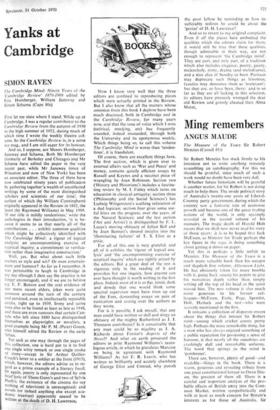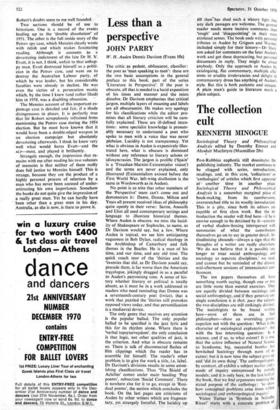Ming remembers
ANGUS MAUDE
The Measure of the Years Sir Robert Menzies (Cassell 45s)
Sir Robert Menzies has stuck firmly to his intention not to write anything remotely resembling an autobiography. For this we should be grateful, since much of such a work would no doubt have been very dull.
Whether future historians will be grateful is another matter, for Sir Robert is not doing much to help them. The inside political story of Australia's twenty-one years of Liberal- Country party government, during which the country saw a fantastic rate of economic growth and become one of the great trading nations of the world, is only sparingly revealed in the second volume of his memoirs. The tragic death of Harold Holt means that we shall now never read his story of those years: it is to be hoped that Jack McEwen, as Minister for Trade perhaps the key figure in the saga, is doing something about getting it down on paper.
Yet this is perhaps a little unfair to Menzies. The Measure of the Years is a much more valuable book than his meagre and slapdash first volume, Afternoon Light. He has obviously taken far more trouble with it, going back among his papers to give his narratives depth rather than simply writing off the top of his head as the spirit moved him. The new volume is also much more generous to his former col- leagues—McEwen, Earle, Page, Spender, Holt, Hasluck and the rest—who were scarcely mentioned in the first.
It remains a collection of disparate essays about the things that interest Sir Robert most—among which cricket comes pretty high. Perhaps the most remarkable thing, for a man who has always enjoyed something of a public reputation for possessing a sense of humour, is that nearly all the anecdotes are crashingly dull and remarkable unfunny. The word that springs .to the mind is `ponderous'.
There are, however, plenty of good—and readable—things in the book. There is a warm, generous and revealing tribute from one great constitutional lawyer to Owen Dix- on, the greatest of them all. There is a careful and important analysis of the pro- bable effects of British entry into the Com- mon Market, written sympathetically and with at least as much concern for Britain's interests as for those of Australia. Sir
Robert's doubts seem to me well founded.
Two sections should be of use to historians. One is a record of the events leading up to the 'double dissolution' of 1951. The other is the full inside story of the Petrov spy case, which Menzies clearly wrote with relish and which makes fascinating reading. Although it amounts to a devastating indictment of the late Dr H. V. Evatt, it is not, I think, unfair to that unhap- py man. Evatt destroyed himself as a politi- cian in the Petrov case, and went on to destroy the Australian Labour party, of which he was leader, but his considerable faculties were already in decline. He was even the victim of a persecution mania which, by the time I knew (and rather liked) him in 1958, was a disabling obsession.
The Menzies account of this important es- pionage case is detailed and fair, if a shade disingenuous in places. It is perfectly true that Sir Robert scrupulously refrained from mentioning the Petrov case during the 1954 election. But he must have known that it would have been a double-edged weapon in an election campaign but absolutely devastating afterwards. I think he knew very well what would harm Evatt—and the atp—most, and played it brilliantly.
Strangely enough, the impression that re- mains with me after reading his two volumes of memoirs is that neither of them really does full justice to Menzies himself. This is strange, because they are the product of a highly personal process of selection by a man who has never been accused of under- estimating his own importance. Somehow the books do not quite give the impression of a really great man. Yet he can hardly have been other than a great man in his day. Australia, as she is now, is there to prove it.











































 Previous page
Previous page